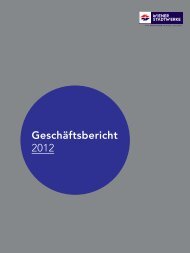Wiener Stadtwerke Annual Report 2012
You also want an ePaper? Increase the reach of your titles
YUMPU automatically turns print PDFs into web optimized ePapers that Google loves.
glossary<br />
Technical and industry-specific terms<br />
Audit<br />
An audit is an independent, systematic inspection of whether, for example,<br />
specific criteria defined in accepted standards are being satisfied. In the context<br />
of the audit, a distinction is made between a certification audit and a renewal<br />
audit. A certification audit is an inspection performed to achieve initial<br />
certification. In order for this to retain its validity, it has to be renewed at regular<br />
intervals (every two or three years). This is done by carrying out a renewal audit.<br />
Biomass<br />
This term refers to all organic, non-fossil materials, and therefore includes<br />
naturally occurring and growing materials and the resulting waste materials both<br />
from living and dead organic matter.<br />
CApEX ratio<br />
The CAPEx ratio is an indicator of the propensity of a company to invest, i.e. the<br />
percentage of turnover invested in tangible and intangible assets.<br />
Capital employed<br />
Shareholder‘s equity + interest-bearing borrowings + provisions for pensions -<br />
securities held to cover pension fund obligations - working capital<br />
Capitalisation ratio<br />
(Fixed assets / total assets) x 100<br />
Cash flow<br />
Cash flow is an economic indicator which expresses the financial resources of a<br />
company and its ability to finance dividend payments, service its debts and fund<br />
investments from its own business activities.<br />
Certification<br />
Certification refers to successfully withstanding an audit of products or services,<br />
operational processes or entire companies performed by an independent and<br />
accredited certification company relating to compliance with criteria, mostly<br />
defined in standards, which is acknowledged by means of the awarding of a<br />
certificate (e.g. seal of approval or standard).<br />
CO 2 emission certificates<br />
These permit the holder to emit a defined quantity of CO 2 . Certificates can be<br />
traded without restriction; their price being determined by the principle of<br />
supply and demand.<br />
Cogeneration technology (Chp)<br />
By producing electricity and heat at the same time – co-generation – fuels can<br />
be used as efficiently as possible.<br />
District cooling<br />
This refers to supplying buildings with refrigerated air for air conditioning<br />
purposes. The necessary refrigeration (cold) is either generated at a refrigeration<br />
centre and then delivered to consumers via well insulated district cooling<br />
networks, or the refrigeration is generated on-site by the consumer by means of<br />
heat absorption machines relying on the hot water supplied by the district<br />
heating network.<br />
64<br />
<strong>Annual</strong> <strong>Report</strong> <strong>2012</strong> ⎢ Glossary<br />
EBiT margin<br />
EBIT margin = EBIT (restated) / turnover (restated)<br />
EBT is the abbreviation for earnings before tax (also referred to as the result of<br />
ordinary activities). It is calculated as follows: EBIT +/- financial result = EBT<br />
EEX (European Energy Exchange)<br />
The EEx is a market place for energy and energy-related products and, with over<br />
200 market players from 22 countries, is currently the leading energy exchange<br />
on the European mainland.<br />
Equity ratio<br />
(Shareholder’s equity / total equity and liabilities) x 100<br />
Equity-to-fixed-assets ratio<br />
[(Shareholder‘s equity + social capital + long-term borrowings + deferred<br />
investment grants)/ fixed assets] x 100<br />
Environmental management system<br />
An environmental management system, e.g. EMAS or ISO 14001, includes a clear<br />
organisational structure, planning activities, responsibilities, codes of conduct<br />
and standard operating procedures in order to ensure compliance with<br />
environmental legislation as well as with voluntary additional targets in terms of<br />
environmental protection.<br />
e-mobility on demand<br />
The pilot project 'e-mobility on demand' is paving the way for an area-wide and<br />
use-oriented e-mobility concept for the Greater Vienna metropolitan area. The<br />
objective is to test important new components of a use-oriented and complex<br />
range of e-mobility services. The overriding aim, however, is to increase the<br />
share of public transport in the modal split and to establish electromobility not<br />
as an alternative but as a supplement to public transport.<br />
Energy efficiency<br />
Energy efficiency is the ratio between energy input and energy output. When<br />
producing electricity in power stations, a considerable proportion of the primary<br />
energy employed is converted into heat. Relying on cogeneration technology,<br />
this heat is used in combined heat and power plants to produce district heating.<br />
Essential services<br />
Providing essential services means ensuring that every citizen has equal access<br />
to all necessary services and facilities which are considered essential to the<br />
smooth running of a modern society, and thus are associated with a particular<br />
responsibility for public welfare.<br />
geothermal energy<br />
Geothermal energy refers to the energy stored in the Earth‘s crust and is<br />
considered to be a renewable source of energy. Geothermal energy can be used<br />
both as a source of heat or cooling, or indirectly for the production of electricity<br />
and heat (relying on cogeneration technology).<br />
isO 14001<br />
ISO 14001 is the ISO standard for eco-management systems.<br />
ipD<br />
Integrated Personnel Development<br />
Modal split<br />
The share of each individual type of transport compared to the total traffic<br />
volume.




